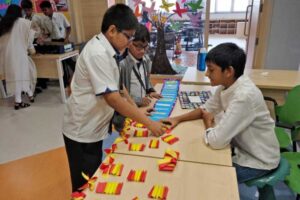Blogs
From IBDP to University Excellence: The Seamless Journey to Higher Education

Walking into a university lecture hall for the first time is like entering a different realm. For many students, this transition signifies a challenging period of adjustment. However, students from Chatrabhuj Narsee School (CNS) Kandivali, who graduate from the International Baccalaureate Diploma Programme (IBDP), often appear notably at ease during these initial weeks. This confidence stems from the school’s implementation of the IBDP, which mirrors the academic rigor and teaching methods of top universities worldwide.
At CNS Kandivali, the IBDP classroom is a dynamic learning environment that mirrors university-style teaching. Take a regular IBDP classroom: instead of just taking notes passively, students take part in discussion-style seminars, perform independent inquiries, and form their own academic views. This manner of teaching closely resembles what is found in top universities around the globe.
The likeness becomes clearer when looking at certain aspects of the programme. For example, IBDP students learn how to manage their time across various subjects, much like university students balancing multiple courses. They gain vital skills for independent study through tasks requiring self-driven research and analysis – essential for university life.
Research Skills: A Base for Academic Success
One valuable preparation for university life comes through the Extended Essay – a 4,000-word research paper that gets the students at CNS Kandivali used to writing assignments at the university level. This experience turns out to be crucial when professors assign major research papers. While some freshmen may grapple with citation rules, research methods, and writing practices, IBDP graduates have already acquired the skill.
For instance: when asked by professors to create a literature review or research proposal, IBDP graduates do not lose their composure. They’ve been trained to:
- Formulate precise and valuable research questions
- Navigate academic databases and assess the reliability of sources
- Integrate information from diverse references
- Construct well-reasoned arguments supported by evidence
- Follow citation and referencing standards
These skills prove invaluable in university settings, where students often grapple with research papers, literature reviews, and proposals. CNS students, equipped with this solid foundation, excel in tackling such assignments with confidence.
Critical Thinking: An Key Asset
The Theory of Knowledge (TOK) component of the IBDP is another area where CNS Kandivali students shine. Universities appreciate students who can critically analyse ideas and delve into intricate concepts. This training becomes evident when they respond to challenging questions about methodologies or evidence during university discussions. The Theory of Knowledge (TOK) aspect of the IBDP fosters these talents. When faced with tough inquiries about methods or evidence from professors, IBDP graduates can reference their TOK knowledge to think analytically and respond carefully.
Practical Laboratory Skills
For those studying sciences in college, the practical lab work undertaken during the IBDP at CNS Kandivali gives them another key edge. The focus on hands-on experiments, data analysis, and writing lab reports allows these learners to confidently enter university labs equipped with know-how about safety protocols and experiment setup – skills that usually take other students lots of time to learn. While many university peers may spend considerable time adapting to these demands, CNS graduates confidently take on such challenges from the start.
Language Skills for Global Opportunities
In our more connected academic world, the emphasis on language learning within the IBDP at CNS Kandivali is particularly relevant. Through studying literature in multiple languages or pursuing additional language courses, students prepare for international opportunities, such as exchange programs and global research collaborations.
Time Management Abilities
Balancing academics and extracurriculars is a hallmark of the CNS Kandivali IBDP experience. Being successful in college requires strong time management abilities. The demanding nature of the IBDP workload along with various deadlines serves as excellent training for this scenario. aspect of higher school. At CNS, students learn to:
– Juggle many tasks and due dates
– Set priorities
– Make achievable study plans
– Handle big projects with everyday work
These abilities translate seamlessly into university life, where independent time management is key to success.
The Social Shift
Beyond academics, the Creativity, Activity, Service (CAS) component of the IBDP at CNS Kandivali ensures holistic development. Through CAS, students acquire essential interpersonal skills by:
- Collaborating in diverse groups
- Taking initiative in projects
- Building meaningful connections with people from varied backgrounds
These experiences prepare CNS students to navigate the social shifts of university life, from joining clubs to forming professional networks.
Worldwide Recognition and Chances
The IBDP’s worldwide recognition is a significant advantage for CNS Kandivali students, opening doors to prestigious universities globally. Admissions committees value the rigorous preparation of IBDP graduates, and many institutions offer college credits for high scores in IBDP subjects. This head start allows CNS alumni to begin their university journeys with added academic momentum.
Practical Learning
CNS Kandivali emphasizes practical learning throughout the IBDP. Whether through science projects, business simulations, or critical literary analyses, students consistently connect theoretical knowledge to real-world applications. This approach aligns with the problem-solving orientation of university education.
After Freshman Year
The benefits of an IBDP education at CNS Kandivali extend well beyond the first year of university. The research skills, critical thinking practices, and time management techniques learned during the program continue with them throughout college and into further studies. Many CNS alumni report feeling exceptionally well-prepared for the demands of graduate school and professional training.
Conclusion: Pathway to Achievement
At Chatrabhuj Narsee School Kandivali, the IBDP does more than ready learners for university – it gives them a thorough kit for academic triumph. With its specially crafted curriculum, focus on self-guided learning, and building essential academic skills, it makes a smooth path from high school to college life.
For those looking not only for university entry but true readiness for it, the IBDP at CNS Kandivali stands as a key stepping stone towards higher education success.





